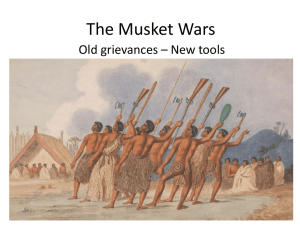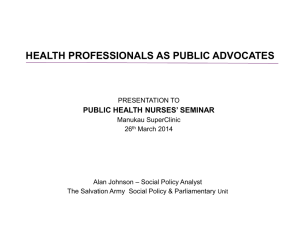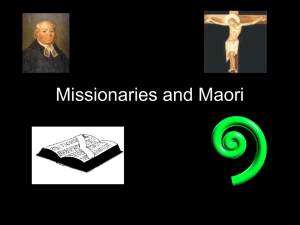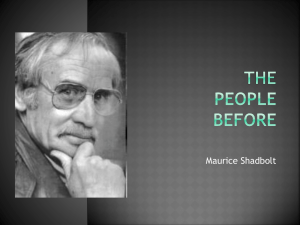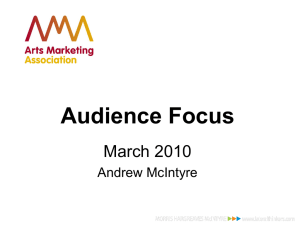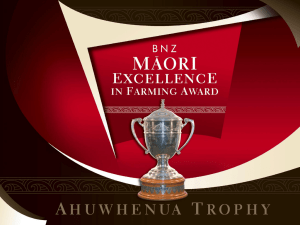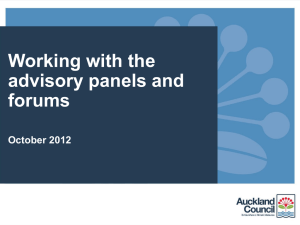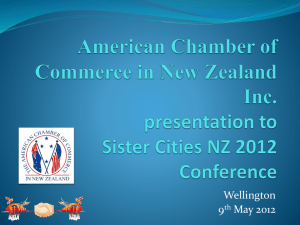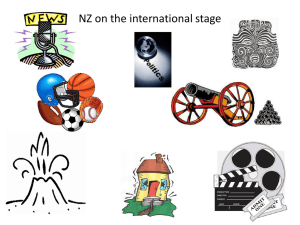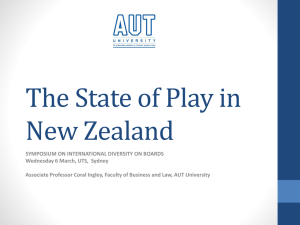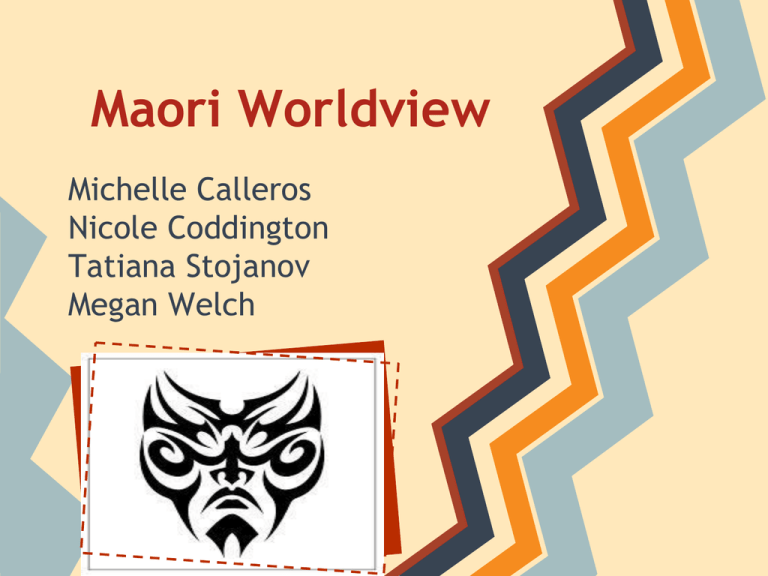
Maori Worldview
Michelle Calleros
Nicole Coddington
Tatiana Stojanov
Megan Welch
Maori People
Maori People
Traditional images
Australia & New Zealand
Maori Demographics
•
•
•
1 in 7 people in New Zealand were
of Māori ethnicity
1 in 4 people of Māori ethnicity
speak the Māori language
Nearly 9 in 10 people of Māori
ethnicity live in the North Island
Who are the Maori people?
•
•
•
The name "Māori" originally meant "the local people", or
"the original people"
The ancestors of the Maori were a Polynesian people
originating from South east Asia.
o Some historians trace the early Polynesian settlers of
New Zealand as migrating from today's China, making
the long voyage traveling via Taiwan, through the South
Pacific and on to New Zealand
The first Polynesians settled mainly around the coast of
New Zealand, and especially the east coast, which was
more temperate climate
Maori Ontology
•
Kaupapa Maori
o conceptualization of Maori knowledge that has been
developed through oral tradition
o process by which Maori mind receives, internalizes,
differentiates, and formulates ideas and knowledge
exclusively through te reo Maori
o Kaupapa Maori is esoteric and tuturu Maori. It is
knowledge that validates a Maori world view and is not
only Māori owned but also Maori controlled
Maori
Ontology
•
•
•
Maori call themselves tangata whenua, people of the land
Members of the various tribes distinguish themselves from
other Maori by referring to the canoe that brought their
ancestors to Aotearoa (New Zealand) and to special
landmarks such as a river or a mountain
They tie their collective and individual identities to
ancestors and places
o When they introduce themselves, they often will give
not only their name, but also the names of their
mountain and river
Maori Ontology
This creation story provides the basis for Maori
philosophy: all creatures are kin, all beings have Maori
(life force), and all are tapu (sacred). People must
respect all beings and relate to them in a proper ritual
manner, always aware of our mutual
interdependencies and always seeking harmony. Yet
we also must live and sometimes this requires us to
have “vigorous relations” such as killing and eating
our kin (other creatures) as long as we do so in the
proper ritual manner that includes being sure that
proper ecological balances are respected.
Maori Epistemology
•
•
•
Maori held an essentially spiritual view of the universe
Anything associated with the supernatural was invested
with tapu, a mysterious quality which made those things or
people sacred or unclean according to context
Their Knowledge resignants with with the nature that
surrounds them, Their Gods, and Their Ancestors
Maori Epistemology
•
•
•
•
Whakapapa is the genealogical descent of all living things
from the gods to the present time
Whakapapa is a basis for the organization of knowledge in
respect of the creation and development of all things
Whakapapa is one of the most prized forms of knowledge
and great efforts are made to preserve it
Whakapapa identifies who I am, where I am from
Maori Ethics
•
Whanaungatanga
o process of establishing meaningful, reciprocal and
familial relationships through culturally appropriate
ways, establishing connectedness and engagement and
therefore a deeper commitment to other people
Religious Beliefs and
Practices
The Indigenous Belief system and the Practices of other beliefs
systems due to colonialism
Religion in New Zealand
Post-colonialism
Spiritual Images
Traditional Maori Core Values
•
Mana
o Mana is a term that relates to power, dignity and
respect.
•
Titiro, whakarongo … korero
o To look, and listen first and then maybe speaking. “This
value emphasizes the importance of looking/observing
and listening in order to develop understandings and
find a place from which to speak” (Smith & Cram, 2001)
Traditional Social Structure
•
•
•
Within the hapu each member did the job for which he or
she was best suited, and rank depended not on the
accumulation of goods but on the extent to which a person
provided them for others
A tohunga was a 'specialist' (e.g., a woodcarver was a
tohunga whakairo rakau) but few were engaged full-time
on their special skill
When not so occupied they would join in the ordinary
everyday work of the tribe from which even the ariki was
not exempt
Maori Wedding Ceremony
Marriage in Traditional Maori
Society
•
•
Marriage within traditional Maori society was shaped by the
importance of family and tribal links
For most people, partners were ideally chosen from within
the hapū or iwi group
o marriages were often arranged, with children promised
in marriage from a very young age
o people sometimes found their own partners
would then seek agreement from senior members of
their family
Marriage in Traditional Maori
Society
•
•
Toanga, or treasure, would be exchanged between the
future couples families
Feasts are then held in the couples' honor
Sex and Marriage
•
•
Regulation of sex was not a primary purpose of marriage
within Maori society
o Most young people were expected to form sexual
relationships
o might have more than one relationship before marriage
in some cases these early relationships became a
marriage
The exception to this sexual freedom were puhi
o young women of high rank, who remained virgins before
marriage
Tangi – Maori Funeral Practice
•
•
•
•
The tangi or tangihanga embraces the funeral rites accorded
a person before the body is finally interred
The Maori belief is that the tupapaku (body of the deceased
person) should not be left on its own at any stage after death
o Family and friends may come and go from this place as
they wish, or they may remain until after the actual
burial
The coffin is left open, and people will touch the tupapaku
Speeches will be made directly to the tupapaku in the belief
that the spirit does not leave the vicinity of the body until
the burial
The Haka
Social Integration
•
•
•
•
Have integrated into most aspects of the predominant
culture with the exception of:
Rugby
o have their own Rugby union (Maori Rugby Union)
o rugby is the most popular sport in New Zealand
Media
o have own television and radio stations
Politics
o specified seat in Parliament reserved for Maori
Maori Representation Act of
1867
•
•
Originally offered 4 seats in Parliament so Maori could be
represented
Now have 7 seats in the Parliament of New Zealand
reserved for them due to the growth in population
Cultural Patterns
•
Oral tradition
•
Strong family ties
•
Important gestures
•
Tattoos
•
Music
•
Dance
Oral Tradition and Family
•
•
•
•
Very strong family units helped because of stories passed
down from generation to generation about their ancestors
Important to maintain the "mana of whapua"
o meaning power of extended family
Chronological time is not of importance so people tell
stories of their ancestors as if they are still present in their
lives
Speaking the stories, rather than just reading them, gives
them closer, more intimate knowledge about Maori culture
and their ancestry
Important Gestures
•
•
•
Removal of shoes before entering a building
o sign of respect
Touching noses
o sign of friendship/love
Sticking out tongue
o intimidation tactic
Ta Moko Tattoos
•
•
•
•
Considered a matter of the spirit
Each individual piece of a tattoo means something
significant to the person, culture and spirituality
A prayer is said before beginning the tattooing process
Full face tattoos are considered a political statement,
recalling times pre-colonization
o Also shows tribal affiliation and ancestry
Ta Moko Tattoos
•
Tattoos will have three different meanings to them
o three is the lucky number
o represents family, the mother, father and child
o also represents a change for the good, like you are
shedding your old skin and having a deeper relationship
with the culture
•
Music and Dance
• Maori are of
Polynesian descent
so they have dances
that are similar to
those of Hawaiians
and Tahitians
•
Have more
aggressive dances,
like the haka, that
were performed
before battle and
are now performed
before rugby games
and at group
celebrations
Minority Group
•
•
Make up about 14% of New Zealand's total population
o approximately 600,000 Maori people
Most live on the North island because of the warmer climate
History of Oppression and War
•
•
•
Maori were oppressed during European colonization
o late 1700's-late 1800's
While a peaceful tribe now, history of wars between other
hapu (sub tribes)
Musket Wars 1807-1842
o series of up to 500 battles
o began after Maori gained access to muskets
o brutal and ruthless battles
o killed, tortured or enslaved rival clans
o some evidence found about cannibalism at this time
Rural to Urban
•
•
Traditionally, Maori people lived in Rural communities
Post Depression era/WWII Maoris moved into larger rural
communities or urban areas in search of employment
Poverty
•
On average Maori have fewer assets than the rest of the
population which has ultimately lead to some negative
outcomes
o high Maori prison population
o high unemployment rates
o high domestic violence rates
Low Formal Education
•
•
Only about half of the Maori population finish school with
higher than an 11th year education
o equivalent to a senior in high school
Half do not go to college
o have high standardized test scores based on a global
scale
•
Health Issues
• Obesity in the Maori is rising at an alarming rate and to
the point of growing into a health crisis
•
•
Two major issues:
o food plays an important role in family and
community life,
o feeding large families increases reliance on the
consumption of commercially produced, poor quality
food
Heart disease and diabetes are of great concern.
o Maori have one of the world’s highest rate of
diabetes
Health Issues
•
Life expectancy:
o 72.8 years for Maori men 76.5 for Maori women
compared to 80.2 and 83.7 for non-Maori in New
Zealand
Health Issues: Government
Policy
•
• A government policy was made in New Zealand, "Closing
the Gaps" is the policy of assisting socially disadvantaged
ethnic groups, particularly the Maori community, through
specially targeted social programs
•
Deculturation has been associated with poor health while
acculturation has been linked to good health. Therefore a
goal of health promotion should be to promote security of
identity
•
•
•
Alcoholism
Maori suffer from high
levels of alcohol and
drug-related problems
85 percent of New
Zealanders aged 16 to
64 drank alcohol in the
past year (Ministry of
Health, 2009)
Maori women are nearly
twice as likely to have a
potentially hazardous
alcohol drinking
pattern, compared to
those in the total New
Zealand population
(Ministry of Health,
2008)
Social Issues
•
•
•
•
The vast majority of the Maori community are urban
dwellers
The Maori continue to suffer many social problems that
accompany urban life in conditions of poverty
In some urban areas, Maori unemployment rates exceed 50
percent
Maori women and children are most likely to experience
domestic violence than any other ethnic group
Social Issues: Unemployment
rates 1986-2011
Social Issues: Prison Statistics
Early-life social and environmental factors
result in Maori being at greater risk of ending
up in adult criminal conduct:
being born to young mothers
lack of family stability
a family environment in which conflict
and violence is common
being exposed to harsh punishment
•
•
•
•
Over-representation of Maori people
forming just 12.5% of the general
population aged 15 and over
50% identify as Maori
•
•
"For example, with respect to the prison
population, the rate of imprisonment for
[New Zealand's] non-Maori population is
around 100 per 100,000. If that rate applied
to Maori also, the number of Maori in prison
at any one time would be no more than 650.
There are however currently 4000 Maori in
prison, six times the number one might
otherwise expect"
-New Zealand Corrections
Prison statistics from March 2011
(Department of Corrections: New Zealand)
Social Issues: Domestic Violence
•
•
New Zealand has one of the worst
rates of domestic violence in the
developed world
Fifty percent of those sentenced for
the offence of "male assaults female"
in the year 2004-2007 were Maori
o
•
•
Maori make up only about 15%
of the country's population
2007 national survey of victims of
crime, 42% of Maori women said a
partner had abused them physically
New Zealand falls into a group of
developed countries with "moderate
to moderately-high" child homicide
rates -Mike Doolan, former Chief
Social Worker, researcher at
Canterbury University
BBC News UK
Prison statistics from March 2011
(Department of Corrections: New Zealand)
Social Issues: Domestic Violence
Why?
lack of family stability
poverty
lack of communication
cycle of violence
•
•
•
•
"Brian Gardner, manager of National Network of Stopping
Violence Services, said men in colonised cultures could
have even less power in the world and end up taking it
out on the people they are closest to."
(BBC News UK: New Zealand Faces it's Dark Secret
2007)
Postcolonial Films of the Maori
Postcolonial Films of the Maori
Bibliography
http://www.everyculture.com/Oceania/Maori-Religion-and-Expressive-Culture.html#ixzz2RR5jRkAl
http://www.everyculture.com/Oceania/Maori-Religion-and-Expressive-Culture.html#ixzz2RmSa7vf7
http://www.teara.govt.nz/en/marriage-and-partnering/page-1
http://www.cleanforum.com/forums/showthread.php?329-Tangi-%96-Maori-funeral-practice
http://www.everyculture.com/Oceania/Maori-Religion-and-Expressive-Culture.html
http://www.rangahau.co.nz/ethics/166/
http://www.kaupapamaori.com/theory/6/
http://www.spiritualtravels.info/articles-2/new-zealand/maori-philosophy/
Bibliography
http://www.virtualoceania.net/newzealand/culture/maori/
http://www.maori.org.nz/
http://www.rotoruanz.com/culture/maori/
http://www.maori.com/
http://www.everyculture.com/Oceania/Maori-Religion-and-Expressive-Culture.html
http://www.sacred-texts.com/pac/mrm/
http://history-nz.org/maori.html
http://www.stats.govt.nz/browse_for_stats/people_and_communities/maori/census-snapshot-maori.aspx

